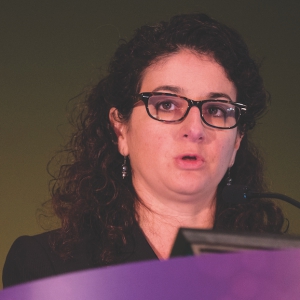Lung cancer remains the leading cause of cancer-related death in the United States and is responsible for almost a quarter (24%) of all cancer deaths, according to the American Cancer Society. Lung cancer is divided into small-cell lung cancer and non–small-cell lung cancer, or NSCLC for short. Most lung cancers are identified as NSCLC, which accounts for about 84% of all lung cancer cases.
Lung Cancer Biomarkers
The treatment of patients with lung cancer has changed dramatically in the past decade, resulting in longer survival for many patients diagnosed with NSCLC, in part as a result of new targeted therapies and immunotherapies, which have been developed based on the discovery of specific biomarkers, or tumor markers, that affect the response to therapy. In the past few years, new immunotherapies and targeted therapies have extended survival for patients with advanced lung cancer.
The selection of the best treatment for an individual patient diagnosed with NSCLC today depends on knowing if and which biomarkers are associated with that lung cancer. These targetable biomarkers, also known as gene mutations or other DNA alterations in cancer cells, can now be treated with targeted therapies or with immunotherapies. Immunotherapies work by getting the patient’s immune system to attack the cancer cells and spare the healthy cells.
Most doctors today use the NSCLC guideline recommendations from the National Comprehensive Cancer Network (NCCN) to select the best treatment for this type of lung cancer. The updated guidelines now recommend that biomarker testing should be done for all patients who are diagnosed with NSCLC.
The current evidence clearly shows that treatment outcomes improve when patients who have a targetable biomarker receive treatment with a therapy that is designed to attack the cells affected by these DNA alterations.

“A relatively new addition to the NCCN NSCLC guidelines is dedicated to biomarker selection. If a recommended targeted option is identified, it is the optimal first-line therapy,” explained Dara L. Aisner, MD, PhD, Associate Professor, Pathology, University of Colorado Cancer Center, University of Colorado School of Medicine, Aurora, at the NCCN annual conference in 2021.
“Different biomarkers predict response to different agents. This has been well-illustrated, and it makes testing critically important for NSCLC patients,” Dr. Aisner pointed out.
Biomarker Testing
Different tests are available today to identify biomarkers in cancer, including a molecular test for many biomarkers and the immunohistochemistry (IHC) test, which looks for the PD-1/PD-L1 biomarker, a protein that is expressed on cancer cells, especially in NSCLC.
The NCCN guidelines now strongly advise that all patients with NSCLC should have a molecular test for the most common biomarkers seen in lung cancer, as well as an IHC test to identify the PD-1/PD-L1 biomarker.
Each of these biomarkers now has 1 or more targeted therapies or immunotherapies available specifically for that biomarker.
PD-1/PD-L1 inhibitors
The 2021 NCCN guidelines also recommend that patients with NSCLC and high PD-L1 expression should receive first-line therapy with a PD-1 or a PD-L1 immunotherapy, also known as PD-1/PD-L1 inhibitors. In the past few years, several immunotherapies have been approved for patients with NSCLC, mostly for patients whose tumor expresses the PD-1/PD-L1 protein.
Patients with low PD-L1 expression should receive first-line combination immunotherapy, with the option to use a single-agent immunotherapy. That is why testing for PD-L1 expression is important before using immunotherapy.
“PD-L1 IHC is a must test, because it can help with first-line therapy decisions,” Dr. Aisner emphasized.
The immunotherapies that are approved for the treatment of patients with advanced or metastatic (stage IV) NSCLC include the PD-1 inhibitors Keytruda (pembrolizumab); Opdivo (nivolumab), to be used alone or in combination with the CTLA-4 inhibitor Yervoy (ipilimumab), another type of immunotherapy; as well as the PD-L1 inhibitors Tecentriq (atezolizumab) and Imfinzi (durvalumab).
In February 2021, Libtayo (cemiplimab-rwlc), another PD-1 inhibitor, became the latest immunotherapy to be approved by the FDA for first-line treatment of patients with locally advanced or metastatic NSCLC and PD-L1 expression of 50% or more who are not candidates for surgery or curative chemotherapy, and who have no other biomarkers.
Advanced Disease
Most of the immunotherapies are approved for the treatment of patients with advanced or metastatic NSCLC and PD-1/PD-L1 expression, including Keytruda, Opdivo, Tecentriq, and Libtayo. The 2021 NCCN guidelines recommend Keytruda, alone or with chemotherapy; Tecentriq; or Libtayo, as the preferred treatment options for patients with metastatic NSCLC and PD-1/PD-L1 high expression (more than 50%), and no other biomarkers.
Other first-line immunotherapy options for this patient population include Tecentriq plus chemotherapy, and Opvido plus Yervoy with or without chemotherapy.
For patients with metastatic or recurrent NSCLC without PD-1/PD-L1 or another biomarker, the combination immunotherapy with Opdivo and Yervoy plus chemotherapy is the recommended option.
This recommendation is based on results of a recent study showing that 2 cycles of chemotherapy plus Opdivo and Yervoy improved survival, regardless of the tumor’s PD-L1 status, in patients with metastatic NSCLC. This combination of 2 immunotherapies plus chemotherapy was superior to chemotherapy alone, in the patients with as well as those without PD-L1 expression.
Early-Stage Disease
At the recent annual meeting of the American Society of Clinical Oncology in June 2021, researchers presented new results showing that treatment with Tecentriq after surgery and chemotherapy in patients with high-risk early-stage (stage II-IIIB) NSCLC and PD-L1 expression significantly extended survival. In this study, Tecentriq reduced the risk of disease progression or death by 34% compared with best supportive care.

“The advances in treating NSCLC have primarily been in the setting of advanced disease. This is the first phase 3 study to demonstrate that immunotherapy after surgery and chemotherapy can significantly delay recurrence in patients with early-stage lung cancer,” stated lead investigator Heather Wakelee, MD, Chief of the Division of Oncology, Stanford University Medical Center.
“Given the significantly improved disease-free survival with adjuvant atezolizumab in patients with PD-L1 expression, it is more important than ever to screen certain high-risk people for lung cancer early and detect PD-L1-positive tumors through biomarker testing,” Dr. Wakelee said. “In this trial, the vast majority of the benefit appeared to be in those patients whose tumors express PD-L1,” she concluded.
Immunotherapy has brought new hope for some patients with lung cancer, and new immunotherapies and targeted therapies are currently being developed for patients with NSCLC and different types of biomarkers.














